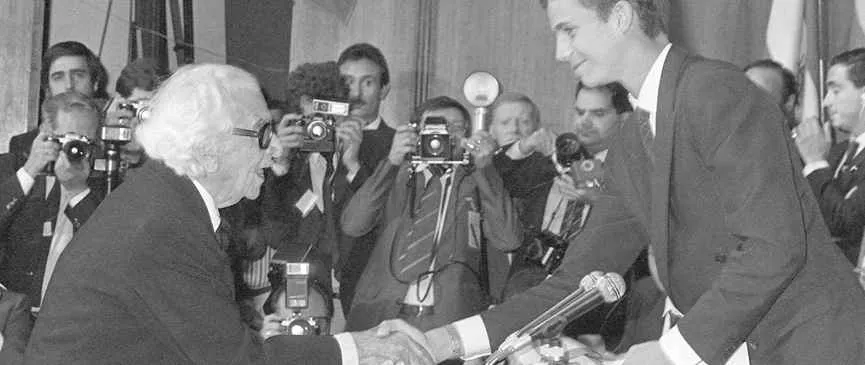Main content
Ramón Carande Thovar Prince of Asturias Award for Social Sciences 1985

An illustrious historian, economist, teacher and writer, Ramón Carande y Thovar (Palencia, Spain, 1887 – Almendral, Extremadura, Spain, 1986) is an essential point of reference for scholars of the history of the "Hacienda de las Indias" (Spanish Imperial Public Finance). His monumental work "Carlos V y sus banqueros" is still an unsurpassed piece of work, a vital reference work for scholars of Spain and Latin America.
His books, his unnumbered contributions to specialist journals, and his admirable life-long teaching work at the University of Seville, make him one of the most important contemporary Spanish historians.
Son of a lawyer, he studied at high school in Santander and later entered the Law Faculty at the University of Madrid, where he was to obtain his doctorate. He continued his studies of economics between 1911 and 1914 in Munich, Berlin, Vienna and London, from the beginning specialising in economic historical research. Upon returning to Spain, he passed the selection examination of the chair of Economics and Public Finance at the University of Seville - where he would one day be Rector - settling in the city in 1918.
A personal friend of Benito Pérez Galdós, José María de Pereda, and Marcelino Menéndez Pelayo, his relations with the Free Education Institute were very solid, and perhaps this was the origin of his life-long liberal character. In 1931, Ramón Carande was designated State Counsellor of the Republic. When Manuel Azaña wanted to appoint him as minister, he would not accept the post as he considered that, not being a member of parliament, he had no right to form part of the government.
During the Spanish Civil War his house in Madrid was occupied, and three thousand manuscripts, as well as numerous summaries which he had drawn up during his research, were destroyed, being used by the combatants as fuel to keep warm. Once the conflict had ended, Ramón Carande, who had belonged to the Agrupación al Servicio de la República (Republican Service Group), was the victim of reprisals and was removed from his chair at the University of Seville. Retiring to the country, he was able to complete his monumental work in three volumes, Carlos V y sus banqueros (La vida económica de España en una fase de su hegemonía, 1516-1556, La Hacienda Real de Castilla y Los caminos del oro y de la plata), with which he was soon to reach international renown and prestige.
Elected as a numerary member of the Royal Academy of History in 1949, Carande was also a pioneer of modern studies into Spanish financial and economic history, as well as a great expert in Spanish and foreign archives. For years, he carried on unceasing research work in the archives of Seville, Palencia, Santander, Badajoz, Salamanca, Madrid, the Archives of the Indies and of Simancas, and those of Antwerp, Vienna, Florence and Rome. Thanks to the extraordinary efforts which he made in studying the historical dimension of the economy, by using new systems of analysis, applied to the original documentary sources, he managed to show, for the first time, the complex reality of the economy and public finances in Spain in the 15th and 16th centuries, making a decisive contribution to laying the historiographic basis for contemporary economic science.
As well as the aforementioned work, Ramón y Carande was the author of the books Sevilla, fortaleza y mercado, Las tierras, las fuentes y la Administración de la ciudad en el siglo XIV, Siete estudios de la historia de España and Galería de raros, a work which was presented in 1982 and which forms a book of memoirs in which the author recalls a whole series of characters which he met during his long life.
Doctor honoris causa of the universities of Lille, Cologne, Berlin, the Complutense of Madrid, Valladolid and Salamanca, he was named a Favoured Son of Andalusia in 1983.
End of main content
